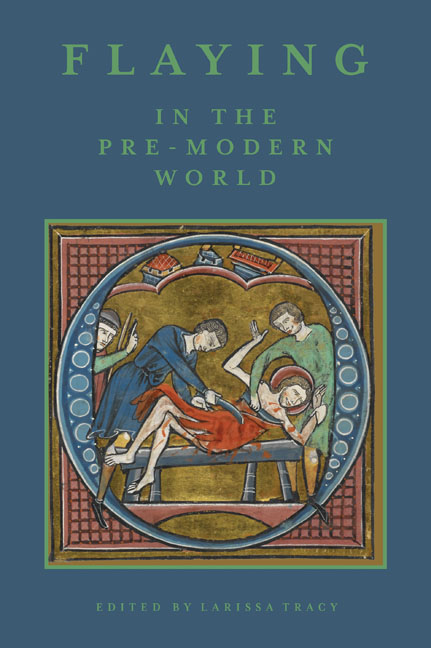12 - Losing Face: Flayed Beards and Gendered Power in Arthurian Literature
Published online by Cambridge University Press: 21 May 2021
Summary
FLAYING, as the OED observes, is often associated with an action ‘to strip or pull off the skin or hide’ from a victim's entire body ( flay v.1a): a most horrific kind of killing or post-killing desecration of the corpse, as many articles in this volume attest. But while the meaning is now obsolete, the verb flay had in the late Middle Ages another, presumably less deadly, meaning: ‘to tear off (a man's beard) together with the skin’ ( flay v.4b). Such an act, though certainly noteworthy for its viciousness, was more than mere punishment: since the beard can serve as a marker of masculinity, its removal shames him whose beard is torn off – shaved – against his will. Building on these same foundations, the further act of beard-flaying – most evident in its use as a recurring motif in Arthurian literature – both shames the flayed victim, and glorifies the victorious flayer: in sum, the flaying of beards grew within Arthurian mythology into a gendered sign of political authority.
Laura Clark, one of the few scholars to investigate this practice, has recently examined what had been a largely ignored component of Thomas Malory's Morte Darthur: the references to characters wearing coats made of beards. Clark demonstrates the importance of the general symbolism of the beard, the history of its wear during the Middle Ages in the East and West, and the specific uses to which Malory puts these beard-coats. She concludes that in Malory's sources such beard-coats hold a ‘monstrous significance’ that often points towards the ‘implications of unbridled imperialism’, and that Malory endeavours to incorporate these meanings into his text in a way that subsumes their negative contexts and leaves King Arthur an unblemished ‘worthy ruler’. What follows here builds upon Clark's findings, expanding the context for her conclusions by filling in a larger history of beard-removals within medieval English Arthurian literature, including the revelation of the practice's apparent origin in Wales, and ultimately delving more deeply into the provocative ways in which the author of one of Malory's key sources – the Alliterative Morte Arthure – has utilized the received symbolism of the removal of beards. When it comes to beards, Arthur may not always be so worthy.
- Type
- Chapter
- Information
- Flaying in the Pre-Modern WorldPractice and Representation, pp. 308 - 321Publisher: Boydell & BrewerPrint publication year: 2017



